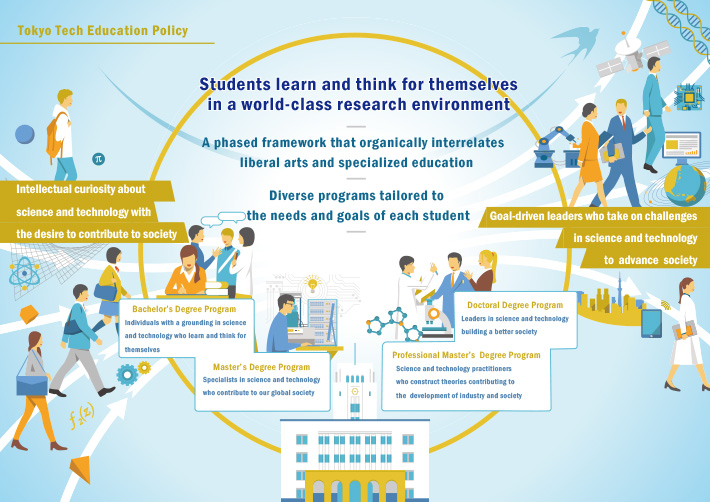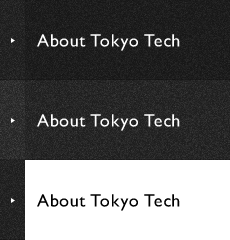|
Specialist skills
|
|
Bachelor's Degree Program
|
Fundamental specialist skillsFundamental expertise to conduct research and development
|
|
Master's Degree Program
|
Broad specialist skillsWide-ranging expertise to conduct in-depth research and development
|
|
Doctoral Degree Program
|
Superior specialist skillsSuperior expertise to promote research and development and generate and systematize new knowledge
|
|
Professional Master's Degree Program
|
Practical specialist skillsPractical expertise in science, technology and socioeconomic systems
|
|
Liberal arts skills
|
|
Bachelor's Degree Program
|
Cultural skills and independent study
- Broad knowledge and language skills necessary to comprehensively grasp matters
- Ability to learn and think for oneself
- Willingness to challenge the unknown
- Understanding of ethical issues
|
|
Master's Degree Program
|
General intercultural skills and developed independent study
- Broad knowledge and language skills necessary to grasp matters from a comprehensive and international perspective
- Ability to continue learning and thinking for oneself with a purpose in mind
- Willingness to try anything
- Understanding of ethical issues
|
|
Doctoral Degree Program
|
Developed intercultural skills and independent study, and self-motivated action
- Systematic and broad knowledge and language skills necessary to understand matters from a comprehensive and international perspective
- Ability to learn, consider, and take concrete actions to generate new knowledge and create value
- Willingness to take on new challenges without setting limits
- Understanding of ethical issues
|
|
Professional Master's Degree Program
|
General intercultural skills and developed independent study
- Broad knowledge and language skills necessary to grasp matters from a comprehensive and international perspective
- Ability to continue learning and thinking for oneself with a purpose in mind
- Willingness to try anything for practical innovation
- Understanding of ethical issues
|
|
Communication skills
|
|
Bachelor's Degree Program
|
Logical explanations and mutual respect
- Skills necessary to provide logical explanations
- Ability to achieve mutual respect and understanding among team members
|
|
Master's Degree Program
|
Various communicative methods using logic
- Skills necessary to provide logical explanations, responding to various circumstances
- Ability to integrate diverse ideas
|
|
Doctoral Degree Program
|
Social leadership
- Skills necessary to provide logical explanations to society, responding to various circumstances
- Ability to exhibit leadership
|
|
Professional Master's Degree Program
|
Various communicative methods using logic
- Skills necessary to provide logical explanations, responding to various circumstances
- Ability to integrate diverse ideas
|
|
Applied skills (inquisitive thinking and/or problem-finding skills)
|
|
Bachelor's Degree Program
|
Organization and analysis
Ability to organize phenomena from a multifaceted perspective and analyze them logically
|
|
Master's Degree Program
|
Passion for exploration
- Ability to organize phenomena from a multifaceted perspective and analyze them logically
- Enthusiasm to explore the mysteries of science and technology
|
|
Doctoral Degree Program
|
Investigative work and new challenges
- Ability to organize phenomena from a multifaceted perspective and analyze them logically
- Skills necessary to explore the mysteries of science and technology
- Ability to perceive the true essence and universality of matters in order to identify and investigate problems and set new challenges
|
|
Professional Master's Degree Program
|
Vision and innovation
- Ability to organize phenomena from a multifaceted perspective and analyze them logically
- Ability to pursue the true essence and universality of matters
- Ability to establish a vision and to innovate in science, technology and industry
|
|
Applied skills (practical and/or problem-solving skills)
|
|
Bachelor's Degree Program
|
Basic problem solving
Ability to solve fundamental problems using knowledge, skills, and creativity
|
|
Master's Degree Program
|
Application of problem-solving skills
Ability to solve practical problems, making full use of broad knowledge, skills, and creativity
|
|
Doctoral Degree Program
|
Advanced problem solving and making a positive impact
- Ability to solve advanced and practical problems, making full use of broad and deep knowledge and skills, initiative, and creativity
- Ability to inspire others
|
|
Professional Master's Degree Program
|
Application of problem-solving skills
Ability to solve practical problems, making full use of broad knowledge, skills, and creativity
|
. Any information published on this site will be valid in relation to Science Tokyo.





